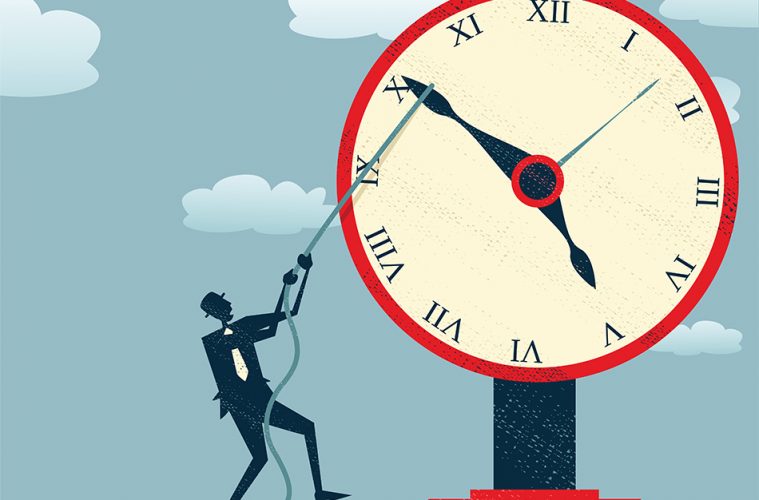Your average week probably looks a lot like mine. You arrive Monday morning with a list of tasks you need to accomplish. The day starts great, but, pretty soon, the reality of being the guy or gal in charge kicks in. An order is late to arrive; a long-term customer needs your advice; an inventory issue crops up; a sales rep drops in; and the list goes on. Being a responsible individual, you try to get your list done before and after store hours, when there are fewer interruptions. That’s a great plan, except that it extends your workday from the mythical eight hours to the more realistic 10 hours or more.
That additional time can’t be subtracted from the time you’re obligated to spend with your family, your church or other civic obligations. Others depend on your presence, and you can’t let them down.
So, where do you find the extra time it takes to get your daily/weekly/monthly/annual list done? If you’re like a lot of store operators, it comes from the only pile of time that you alone can control: your personal time. (Something I would do at this point is say, “I don’t need another tutorial on time management,” and flip the page. Stay with me here. Time management is an old, tired topic, but that is not what this article is about. This article is about time ownership.)
Although we are self-programmed never to short the store on our time obligations, we know it’s equally important to get in family time and to meet our civic obligations. I’m going to suggest that it’s just as important to schedule personal time (i.e., time spent doing something just because we want to do it, not because others are depending on us).
I am perhaps the world’s worst at protecting my personal time, instead sacrificing it on the altar of other obligations. But, I’ve come to realize that becoming overdrawn in the personal time column creates a deficit in the other two columns. Without regular personal time—time away from obligations to others—I’m not as effective, nor as sharp, as I can be. I’ve stopped thinking of my time as something I manage and, instead, I’ve started to think of it as something I own. I have 24 hours each day. If I’m going to perform as well as I can during store and family time, I’d better protect my personal time and make sure it doesn’t become reassigned without my permission.
My mother-in-law has been quoted as saying, “A person needs 30 minutes of fun every day to be healthy,” and I think she’s right. (Please don’t tell her I said that.) I’ve decided that, in order to meet my store and family obligations properly, I owe it to them to take personal time on a regular basis. Working with civic groups doesn’t count as personal time, either, even if I enjoy it. Going to church doesn’t count. Visiting with family doesn’t count. All those things are important, but they aren’t personal time.
My personal time is something I own…it’s mine. I spend it reading non-business-related books or magazines, playing ham radio, working on my coin collection or Scout patch collection, or building something in the shop. Personal time is how I recharge my batteries, so that I can feel happier, perform better, and meet my obligations without finding myself drained and ornery at the end of the workday.
Own your personal time. Decide when it is, and then enjoy it. Refuse to allow non-critical situations to interfere with this vital component of your mental and physical well-being. If, at the end of the day, you still have unfinished, non-time-sensitive tasks at the store, put them on your list for tomorrow. If you’ve put in a full day, don’t erode your personal time to complete store tasks. Protect your personal time so that you’ll be at your peak tomorrow, when you tackle the next day’s list.
Years ago, I was talking to an older man about my upcoming weeklong vacation. I told him the list of home-maintenance projects I was going to get done during the week. He told me how sorry he was to hear that I wasn’t getting a vacation. “But I am!” I told him. “I won’t be going back to work for a week!” He pointed out that I wasn’t leaving work; instead, I was merely changing its location for a few days. That, he said, was no way to live. I think he was, and is, right.
Part of owning your personal time is doing something different from what’s involved in the other two columns. Think of something you wish you could do, and then learn how to do it. Learn a new language. A lot of state universities offer free college courses to folks of a certain age. Learn how to fly a plane and get a pilot’s license. Study martial arts. After all, there’s no upper age limit on learning taekwondo or judo. Take a cooking class or join a local book club. Research your family tree. Take a wine appreciation course. Learn to whittle. There’s a long list of new things you can do…things that will revive the old spark, recharge you and leave you once again ready to tackle the store.
New ideas and new skills can foster a sense of excitement that’s hard to acquire anywhere else. That renewed sense of mental vigor can translate to feeling better at the store, or at your next family gathering.
Your coworkers and family will thank you for it.


